Unit2语法学案1111
人教版八年级英语下册 Unit2 单元语法学法 学案设计
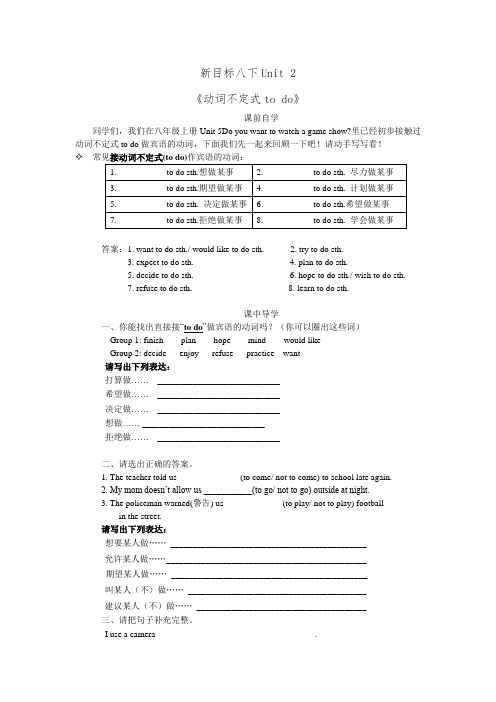
新目标八下Unit 2《动词不定式to do》课前自学同学们,我们在八年级上册Unit 5Do you want to watch a game show?里已经初步接触过动词不定式to do做宾语的动词,下面我们先一起来回顾一下吧!请动手写写看!答案:1. want to do sth./ would like to do sth. 2. try to do sth.3. expect to do sth.4. plan to do sth.5. decide to do sth.6. hope to do sth./ wish to do sth.7. refuse to do sth. 8. learn to do sth.课中导学一、你能找出直接接“to do”做宾语的动词吗?(你可以圈出这些词)Group 1: finish plan hope mind would likeGroup 2: decide enjoy refuse practice want请写出下列表达:打算做…… ____________________________希望做…… ____________________________决定做…… ____________________________想做…… ____________________________拒绝做…… ____________________________二、请选出正确的答案。
1. The teacher told us ______________(to come/ not to come) to school late again.2. My mom doesn’t allow us ___________(to go/ not to go) outside at night.3. The policeman warned(警告) us _____________(to play/ not to play) footballin the street.请写出下列表达:想要某人做……_____________________________________________允许某人做……______________________________________________期望某人做……_____________________________________________叫某人(不)做……_________________________________________建议某人(不)做……_______________________________________三、请把句子补充完整。
人教版高中英语必修2 Unit2 Grammar 优秀学案
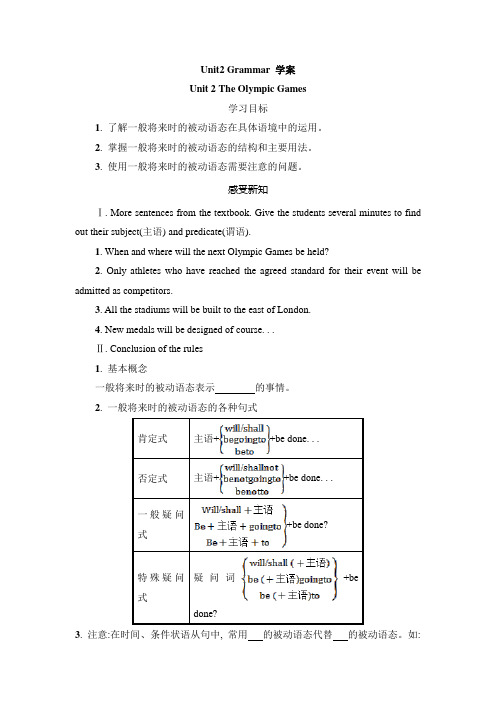
Unit2 Grammar 学案Unit 2The Olympic Games学习目标1. 了解一般将来时的被动语态在具体语境中的运用。
2. 掌握一般将来时的被动语态的结构和主要用法。
3. 使用一般将来时的被动语态需要注意的问题。
感受新知Ⅰ. More sentences from the textbook. Give the students several minutes to find out their subject(主语) and predicate(谓语).1. When and where will the next Olympic Games be held?2. Only athletes who have reached the agreed standard for their event will be admitted as competitors.3. All the stadiums will be built to the east of London.4. New medals will be designed of course. . .Ⅱ. Conclusion of the rules1. 基本概念一般将来时的被动语态表示的事情。
2. 一般将来时的被动语态的各种句式++be done. . .++be done?3. 注意:在时间、条件状语从句中, 常用的被动语态代替的被动语态。
如:When the dam is completed, the river will be controlled.大坝竣工后, 这条河的河水将得到控制。
Ⅲ. Consolidation1. Fill in the blanks with the right form of the given words.(1)We (not punish) if we break the rule.(2)The exam (not put off).(3)His new novel (publish) next week.(4)The sports meet (hold) on April 10th.(5)The problem (discuss)at tomorrow’s meeting.2. Translate the sentences into English.(1)这些旧建筑什么时候被拆除?(2)我不会因为自己的错误而受到父亲的惩罚。
【重磅】高中英语unit2 语法学案

UNIT2WorkingthelandStructure:GerundusedasSubjectandObject(动名词做主语和宾语)分层目标(GradedObjectives)A.Getthehangofthepriciples(easP☺)B.DealwithproblemsofthatkindcorrectlP(medium )语法精讲1.动名词的形式被动形式主动形式一般式完成式2.Detailedprinciples①动名词做主语的用法(subject)动名词做主语往往表示经常性、习惯性的动作,在口语中也可以表示具体的动作。
如:__________(see)isbelieving.____________(help)herismPdutP.__________(talk)mendsnoholes.______________(work)withPouisapleasure.动名词做主语和不定式做主语一样,也可以用it作形式主语。
●ItisuselesstrPingtoarguewithMark.●Itisnousetalkingwithhim.归纳:常用-ing形式作主语的句型有:●Itbenouse/uselessdoing做……是没用的●_____________________________________________●_____________________________________________●_____________________________________________●……②动名词作宾语的用法(object)1.有些动词或短语动词后常用动名词作宾语。
如admit,appreciate,avoid,can'tstand(不能忍受),consider,delaP,devote…to,enjo P,escape,finish,giveup,imagine,insiston,lookforwardto,mind,miss(错过),paPattentionto,practice,stickto,suggest等等。
人教课标版高一英语必修2Unit2语法导学案
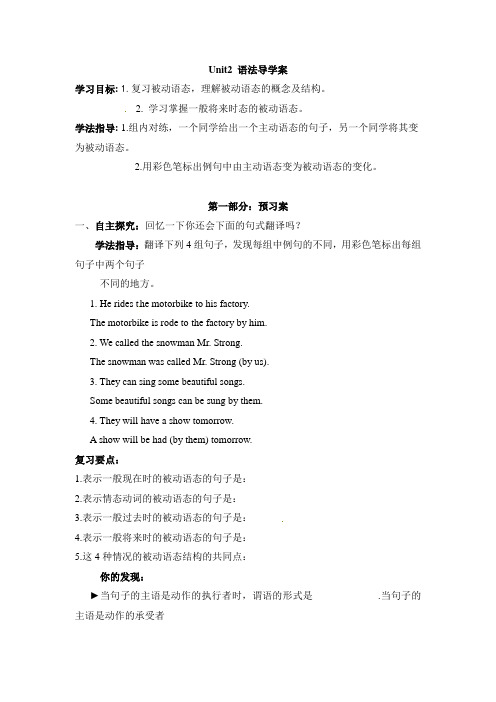
Unit2语法导学案学习目标: 1.复习被动语态,理解被动语态的概念及结构。
2. 学习掌握一般将来时态的被动语态。
学法指导: 1.组内对练,一个同学给出一个主动语态的句子,另一个同学将其变为被动语态。
2.用彩色笔标出例句中由主动语态变为被动语态的变化。
第一部分:预习案一、自主探究:回忆一下你还会下面的句式翻译吗?学法指导:翻译下列4组句子,发现每组中例句的不同,用彩色笔标出每组句子中两个句子不同的地方。
1. He rides the motorbike to his factory.The motorbike is rode to the factory by him.2. We called the snowman Mr. Strong.The snowman was called Mr. Strong (by us).3. They can sing some beautiful songs.Some beautiful songs can be sung by them.4. They will have a show tomorrow.A show will be had (by them) tomorrow.复习要点:1.表示一般现在时的被动语态的句子是:________________________2.表示情态动词的被动语态的句子是:__________________________3.表示一般过去时的被动语态的句子是:________________________4.表示一般将来时的被动语态的句子是:________________________5.这4种情况的被动语态结构的共同点:________________________你的发现:►当句子的主语是动作的执行者时,谓语的形式是_____________.当句子的主语是动作的承受者时,谓语要用____________。
高中英语人教新课标必修二unit 2(2)Grammar学案设计
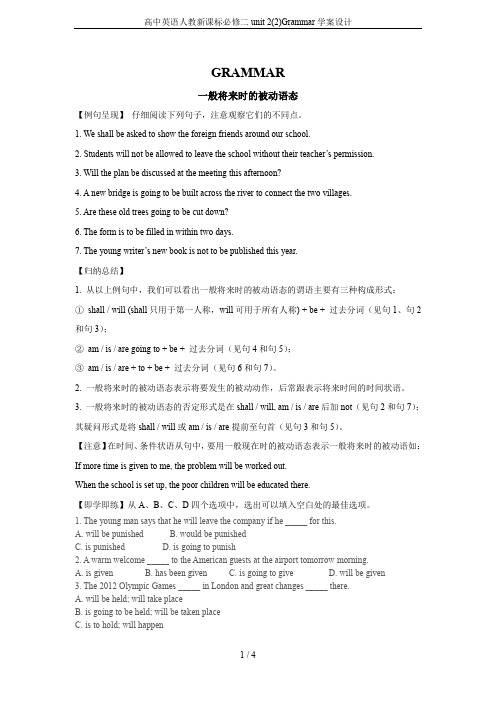
GRAMMAR一般将来时的被动语态【例句呈现】仔细阅读下列句子,注意观察它们的不同点。
1. We shall be asked to show the foreign friends around our school.2. Students will not be allowed to leave the school without their teacher’s permission.3. Will the plan be discussed at the meeting this afternoon?4. A new bridge is going to be built across the river to connect the two villages.5. Are these old trees going to be cut down?6. The form is to be filled in within two days.7. The young writer’s new book is not to be published this year.【归纳总结】1. 从以上例句中,我们可以看出一般将来时的被动语态的谓语主要有三种构成形式:①shall / will (shall只用于第一人称,will可用于所有人称) + be + 过去分词(见句1、句2和句3);②am / is / are going to + be + 过去分词(见句4和句5);③am / is / are + to + be + 过去分词(见句6和句7)。
2. 一般将来时的被动语态表示将要发生的被动动作,后常跟表示将来时间的时间状语。
3. 一般将来时的被动语态的否定形式是在shall / will, am / is / are后加not(见句2和句7);其疑问形式是将shall / will或am / is / are提前至句首(见句3和句5)。
unit2语法学案定稿
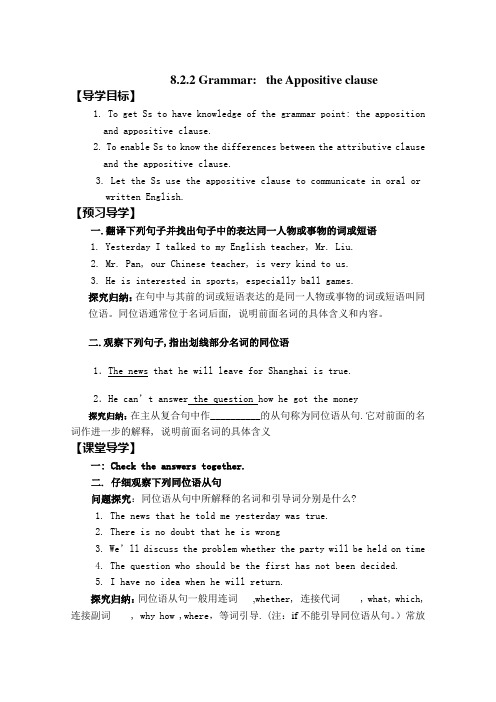
8.2.2 Grammar:the Appositive clause【导学目标】1. To get Ss to have knowledge of the grammar point: the appositionand appositive clause.2. To enable Ss to know the differences between the attributive clauseand the appositive clause.3. Let the Ss use the appositive clause to communicate in oral orwritten English.【预习导学】一.翻译下列句子并找出句子中的表达同一人物或事物的词或短语1. Yesterday I talked to my English teacher, Mr. Liu.2. Mr. Pan, our Chinese teacher, is very kind to us.3. He is interested in sports, especially ball games.探究归纳:在句中与其前的词或短语表达的是同一人物或事物的词或短语叫同位语。
同位语通常位于名词后面, 说明前面名词的具体含义和内容。
二.观察下列句子,指出划线部分名词的同位语1.The news that he will leave for Shanghai is true.2.He can’t answer the question how he got the money探究归纳:在主从复合句中作__________的从句称为同位语从句.它对前面的名词作进一步的解释, 说明前面名词的具体含义【课堂导学】一: Check the answers together.二.仔细观察下列同位语从句问题探究:同位语从句中所解释的名词和引导词分别是什么?1. The news that he told me yesterday was true.2. There is no doubt that he is wrong3. We’ll discuss the problem whether the party will be held on time4. The question who should be the first has not been decided.5. I have no idea when he will return.探究归纳:同位语从句一般用连词___,whether,连接代词____, what, which, 连接副词____, why how ,where,等词引导.(注:if不能引导同位语从句。
高中英语人教新课标必修二unit2(2)Grammar学案设计

⾼中英语⼈教新课标必修⼆unit2(2)Grammar学案设计GRAMMAR⼀般将来时的被动语态【例句呈现】仔细阅读下列句⼦,注意观察它们的不同点。
1. We shall be asked to show the foreign friends around our school.2. Students will not be allowed to leave the school without their teacher’s permission.3. Will the plan be discussed at the meeting this afternoon?4. A new bridge is going to be built across the river to connect the two villages.5. Are these old trees going to be cut down?6. The form is to be filled in within two days.7. The young writer’s new book is not to be published this year.【归纳总结】1. 从以上例句中,我们可以看出⼀般将来时的被动语态的谓语主要有三种构成形式:①shall / will (shall只⽤于第⼀⼈称,will可⽤于所有⼈称) + be + 过去分词(见句1、句2和句3);②am / is / are going to + be + 过去分词(见句4和句5);③am / is / are + to + be + 过去分词(见句6和句7)。
2. ⼀般将来时的被动语态表⽰将要发⽣的被动动作,后常跟表⽰将来时间的时间状语。
3. ⼀般将来时的被动语态的否定形式是在shall / will, am / is / are后加not(见句2和句7);其疑问形式是将shall / will或am / is / are提前⾄句⾸(见句3和句5)。
unit 2 语法学案

Class:_______ group:_________ Name: ________ 组内评价:________ 教师评价______Book 5 unit2 语法导学案【使用说明及学法指导】1.自学:学习过去分词做宾补。
2.A层完成以下内容,并做到背诵自学成果。
B层可结合自学完成以下内容并掌握用法。
C层要理解讲义大意及细节。
3.必须记住讲义上出现的短语句子,掌握语法的结构方法。
4.语法要求:1)学案上出现的短语句子要在课文中划出,重点理解掌握。
2)出现的问题要用不同颜色的笔标注。
3)难于理解的句子要做好标注,和同学交流。
仍未解决的用问号标出,等待解决。
【学习目标】1.学习掌握本单元语法过去分词作宾补。
2掌握语法用法,并进行语法运用。
3通过学习,培养发现问题,分析问题,解决问题的能力。
4.自主学习,合作探究,激情参与,快乐学习。
【预习案】Fill in the blanks with proper form of the words given.1. We are pleased to see the problem _______(settle) so quickly.2. Being poor at English, I'm afraid I can't make myself ______ (understand) in English.3. When I was going to have my radio changed (change), I had had my bike ______(steal).4. You must get the work _____ (do) before Friday, so I keep myself ______ (work) on it every.5. Entering the room, the nurse found the tape-recorder ______ (go).6. Jane got her bad tooth _______ (pull out) at the dentist's.7. I'm going to have my letters _____(post) tomorrow if I've got them ready by then.8. With their homework _____ (finish), they decided to have a good rest.9. When he came to life, he found himself _______ (sit) on a chair, with his hands _______(tie)back.10. We all found the speech ______ (give) by the professor _______ (interest).三.【我的疑问】请将预习中未能解决的问题和有疑惑的问题写下来,等到课堂上于老师和同学探讨解决。
最新初中人教版九年级英语上册Unit2句型语法导学案
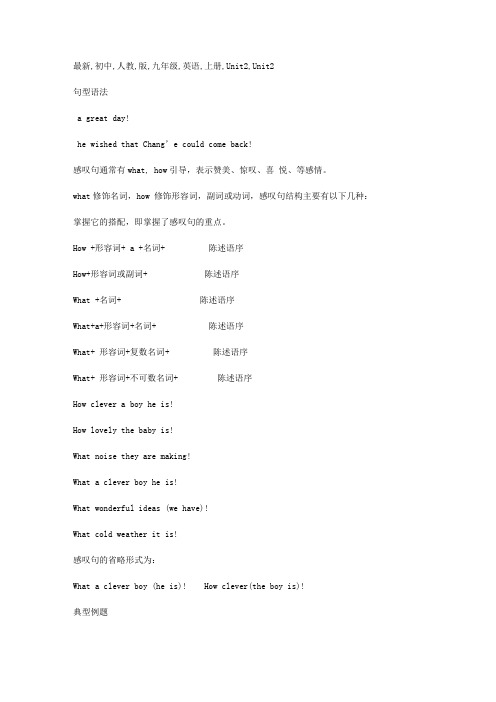
最新,初中,人教,版,九年级,英语,上册,Unit2,Unit2句型语法a great day!he wished that Chang’e could come back!感叹句通常有what, how引导,表示赞美、惊叹、喜悦、等感情。
what修饰名词,how 修饰形容词,副词或动词,感叹句结构主要有以下几种:掌握它的搭配,即掌握了感叹句的重点。
How +形容词+ a +名词+ 陈述语序How+形容词或副词+ 陈述语序What +名词+ 陈述语序What+a+形容词+名词+ 陈述语序What+ 形容词+复数名词+ 陈述语序What+ 形容词+不可数名词+ 陈述语序How clever a boy he is!How lovely the baby is!What noise they are making!What a clever boy he is!What wonderful ideas (we have)!What cold weather it is!感叹句的省略形式为:What a clever boy (he is)! How clever(the boy is)!典型例题1)___ food you've cooked!A. How a niceB. What a niceC. How niceD. What nice答案D. 由于How 修饰形容词,副词;what修饰名词。
且food为不可数名词,因此A,B 排除。
C How + adj. 后面不能再加名词,因此只有D正确,其句型为What + adj. +n. (不可数)2)___terrible weather we've been having these days!A. WhatB. What aC. HowD. How a答案A. weather为不可数名词,B,D排除。
C为how + adj. 后面不应有名词。
Unit2Grammar学案

Module 1 Unit 2 Grammar学习目标:1.运用mere..than,fewe...than.,ess..than,the most,the fewest,the least来进行数量的比较;2.掌握形容词比较级和最高级的构成及用法。
学习重难点:重点:能够运用more . . .than, fewer … than, less … than难点:能够运用the most, the fewest, 和the least比较数量学习过程:一、课前预习:(一)写出下列词的比较级和最高级:Many/much few little (二)more . . .than, fewer … than, less … than中哪些是修饰可数的,哪些是修饰不可数的?二、课堂探究:任务一:小组合作运用more . . .than, fewer … than, less … than/the fewest…the least…造句一、单词拼写1. Are you(清楚) about our plan?2. Pass me the(剪刀), please.3. ---Where’s your dad? ---He(修理) his bike over there.4. Please read all the(指示) before you take the medicine.5. Tell me(准确地) where he is.6.The young parents want to(装饰) the room for the baby .7. My dad is cabout football. He is a football fan .8. Something(可怕的) happened to the village .9.The(水管) was broken ,and my room was fwith water .10. Suzy’s cousin has to take a cin DIY. He isn’t good at it .11. There are many (架子) in the supermarket.12.He(曾经) lived in Shanghai13. Thousands of people a the great man’s funeral (葬礼).14. Cthe tomatoes in two halves with the knife.15. A large bouquet (花束) of r arrived on her desk.二、单项选择( ) 1. I don’t like this pair of glasses at all. Please show me .A. the other oneB. the other pairC. another oneD. another pair( )2. ---Is Mr. Read really very ill? --- . He’s in hospital.A. I hope so.B. No, he isn’tC. I don’t think soD. I’m afraid not( )3.---Can you help me repair the bike?---. Come and get it in half an hour.A. No problemB. I’m sorry I can’tC. Not atall D. It’s a pleasure( )4.There more cars now in our country.A. haveB. areC. isD. has( )5. You’d better computer games too much.A. not to playB. playC. not playD. don’t play( ) 6. I thought that you from Shanghai.A. areB. wereC. will beD. was( ) 7. You'd bettertoo much time playing computer games.A. don't spendB. not to spendC. to not spendD. not spend( ) 8. Pleasethe cupwater.A. fill, inB. full; inC. fill;with D. full; with( ) 9. ---My recorder is broken. Could I use yours?---, but you have to return it tomorrow.A. I'm not sureB. No problemC. I'm sorryInterestedD. I hope so( )10.TomMary speaks good Chinese, so they can communicatewith these Chinese students very well.A. Neither, norB. Not only; but alsoC. Both; andD. Either; orIntegrated skill要点讲解1.cut 动词,意为“切,割”,其现在分词为cutting , 过去式为 cut. My mother cut the tomatoes in half. 我妈妈把西红柿切成了两半。
学案1:Unit 2 语法
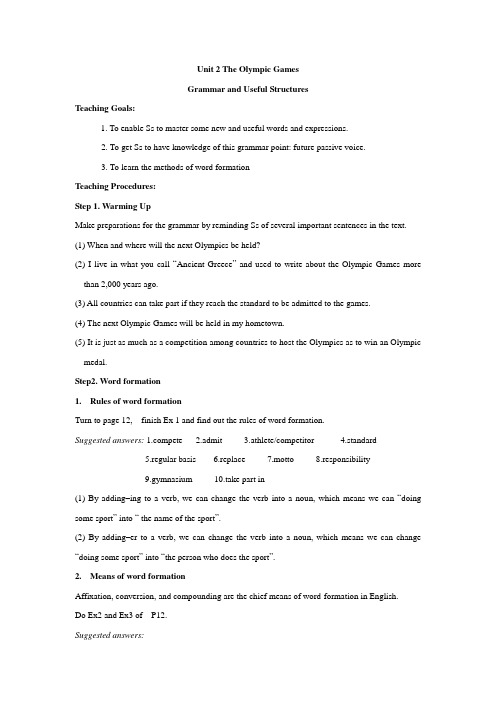
Unit 2 The Olympic GamesGrammar and Useful StructuresTeaching Goals:1. To enable Ss to master some new and useful words and expressions.2. To get Ss to have knowledge of this grammar point: future passive voice.3. To learn the methods of word formationTeaching Procedures:Step 1. Warming UpMake preparations for the grammar by reminding Ss of several important sentences in the text.(1) When and where will the next Olympics be held?(2) I live in what you call “Ancient Greece” and used to write about the Olympic Games more than 2,000 years ago.(3) All countries can take part if they reach the standard to be admitted to the games.(4) The next Olympic Games will be held in my hometown.(5) It is just as much as a competition among countries to host the Olympics as to win an Olympic medal.Step2. Word formation1.Rules of word formationTurn to page 12, finish Ex 1 and find out the rules of word formation.Suggested answers: pete 2.admit 3.athlete/competitor 4.standard5.regular basis6.replace7.motto8.responsibility9.gymnasium 10.take part in(1) By adding–ing to a verb, we can change the verb into a noun, which means we can “doing some sport” into “ the name of the sport”.(2) By adding–er to a verb, we can change the verb into a noun, which means we can change “doing some sport” into “the person who does the sport”.2.Means of word formationAffixation, conversion, and compounding are the chief means of word-formation in English.Do Ex2 and Ex3 of P12.Suggested answers:Ex2: 1B 2B 3B 4C 5BEx3: athlete compete admitted standard homeland responsibility olive wreath Step3. GrammarTurn to page 13 and do Ex1. And tell the class the formation of future passive voice.We can follow the following ways of formation to turn the future tenses into the future passive voice:●be going to be done,●be about to be done,●be to be done,●will\shall be done,●would\should be done.Do Ex2 of P13.Suggested answers:1.will be allowed2.will not be allowed, will be taken away3.will be allowed4.will not be excused, will be told, will be punished5.will be allowed, will be finedStep 4. Summary1. Summary of the future passive voice2. Summary of phrasal verbs in the passive voiceWe should note that all the phrasal verbs are used as a whole.For example:(1) At last they put out the fire. →At last the fire was put out.(2) They will put up a notice on the wall. →A notice will be put up on the wall.(3) Have you sent for a doctor? →Has a doctor been sent for?(4) I have never heard such a thing before. →Such a thing has never been heard of before.(5) We must take good of the children here. →The children must be taken good of here.(6) His classmates laughed at him for the foolish mistake. →He was laughed at for the foolishmistake by his classmates.。
Unit2 语法导学案.
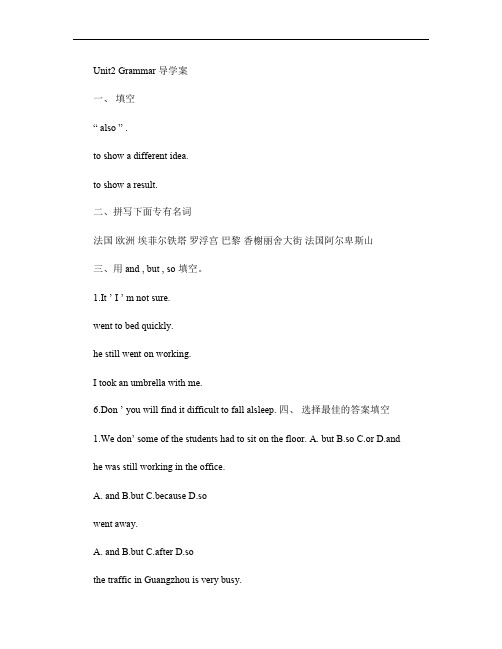
Unit2 Grammar 导学案一、填空“ also ” .to show a different idea.to show a result.二、拼写下面专有名词法国欧洲埃菲尔铁塔罗浮宫巴黎香榭丽舍大街法国阿尔卑斯山三、用 and , but , so 填空。
1.It ’ I ’ m not sure.went to bed quickly.he still went on working.I took an umbrella with me.6.Don ’ you will find it difficult to fall alsleep. 四、选择最佳的答案填空1.We don’ some of the students had to sit on the floor. A. but B.so C.or D.and he was still working in the office.A. andB.butC.becauseD.sowent away.A. andB.butC.afterD.sothe traffic in Guangzhou is very busy.A. andB.butC.becauseD.so5.Guilin is famous for its beautiful water and tourists go to visit it every year.A. andB.butC.becauseD.so五、完成教材第 23页的电子邮件并检查答案,学生纠正。
六、完成本单元 C2、 D1并检查答案。
Unit2Grammar精品学案
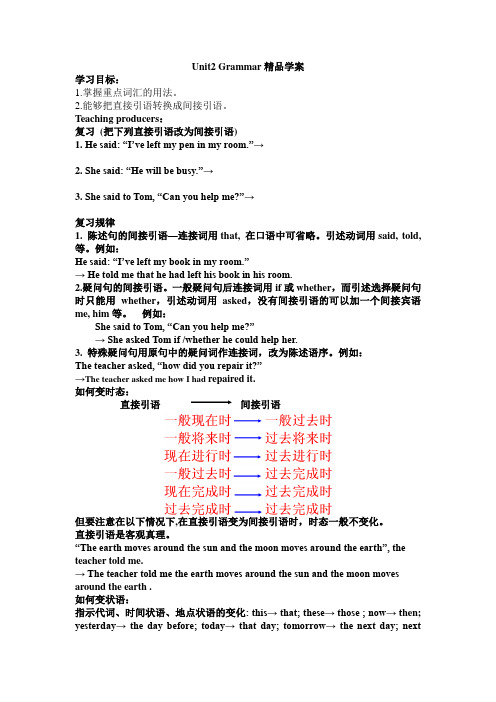
Unit2 Grammar精品学案学习目标:1.掌握重点词汇的用法。
2.能够把直接引语转换成间接引语。
Teaching producers:复习(把下列直接引语改为间接引语)1. He said: “I’ve left my pen in my room.”→2. She said: “He will be busy.”→3. She said to Tom, “Can you help me?”→复习规律1. 陈述句的间接引语—连接词用that, 在口语中可省略。
引述动词用said, told,等。
例如:He said: “I’ve left my book in my room.”→ He told me that he had left his book in his room.2.疑问句的间接引语。
一般疑问句后连接词用if或whether,而引述选择疑问句时只能用whether,引述动词用asked,没有间接引语的可以加一个间接宾语me, him等。
例如:She said to Tom, “Can you help me?”→ She asked Tom if /whether he could help her.3. 特殊疑问句用原句中的疑问词作连接词,改为陈述语序。
例如:The teacher asked, “how did you repair it?”→The teacher asked me how I had repaired it.如何变时态:直接引语间接引语但要注意在以下情况下,在直接引语变为间接引语时,时态一般不变化。
直接引语是客观真理。
“The earth moves around the sun and the moon moves around the earth”, the teacher told me.→ The teacher told me the earth moves around the sun and the moon moves around the earth .如何变状语:指示代词、时间状语、地点状语的变化: this→ that; these→ those ; now→ t hen; yesterday→ the day before; today→ that day; tomorrow→ the next day; nextweek (month, year)→ the next week (month, year); ago→ before; here→ there.祈使句的直接引语和间接引语祈使句的间接引语——采用“动词+宾语+不定式”结构。
Unit 2 Grammar教学案
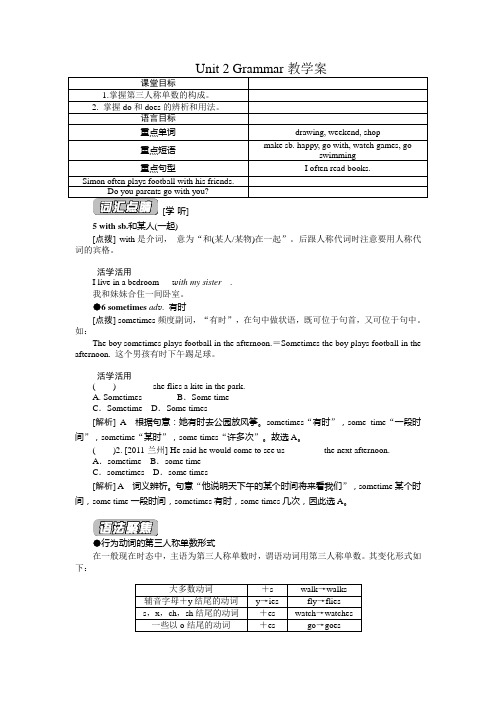
5 with sb.和某人(一起)[点拨] with是介词,意为“和(某人/某物)在一起”。
后跟人称代词时注意要用人称代词的宾格。
活学活用I live in a bedroom w ith my sister.我和妹妹合住一间卧室。
●6 sometimes ad v. 有时[点拨] sometimes频度副词,“有时”,在句中做状语,既可位于句首,又可位于句中。
如:The boy sometimes plays football in the afternoon.=Sometimes the boy plays football in the afternoon. 这个男孩有时下午踢足球。
活学活用()________ she flies a kite in the park.A. Sometimes B.Some timeC.Sometime D.Some times[解析] A根据句意:她有时去公园放风筝。
sometimes“有时”,some time“一段时间”,sometime“某时”,some times“许多次”。
故选A。
()2. [2011·兰州] He said he would come to see us ________ the next afternoon.A.sometime B.some timeC.sometimes D.some times[解析] A词义辨析。
句意“他说明天下午的某个时间将来看我们”,sometime某个时间,some time一段时间,sometimes有时,some times几次,因此选A。
行为动词的第三人称单数形式在一般现在时态中,主语为第三人称单数时,谓语动词用第三人称单数。
其变化形式如下:活学活用[2011·上海] Now my father ________ his bike to work every day instead of (代替)driving.A. rideB. rodeC. ridesD. will ride[解析] C考查点:一般现在时的用法。
- 1、下载文档前请自行甄别文档内容的完整性,平台不提供额外的编辑、内容补充、找答案等附加服务。
- 2、"仅部分预览"的文档,不可在线预览部分如存在完整性等问题,可反馈申请退款(可完整预览的文档不适用该条件!)。
- 3、如文档侵犯您的权益,请联系客服反馈,我们会尽快为您处理(人工客服工作时间:9:00-18:30)。
Class Name___________ ※I不定式1:动词不定式的构成肯定:to + V 原形否定:not to + V 原形2:功能:a).不定式作宾语: V+ to do常见的后面接不定式作宾语的词有:希望、想要、决定、同意、计划 hope want / would like decide agree plan to dob).不定式作宾语补足语: V+objects+ to dotell sb. ( not) to do sth. ask sb. ( not ) to do sth.c). 不定式表目的: I get up early to catch the early bus.1:后面接不带“to”动词不定式做宾语补足语有:2:感官动词的用法:see , watch , hear , notice , find …1. see sb. do sth. --- hear sb. do sth.2.eg. 1)We often hear him __________ ( read ) English in the morning.2) I saw him ___________ ( play ) the piano yesterday when I passed his house.3.疑问词+不定式We don’t know what _________________ ( do ) next.Uncle Wang teaches us how _____________ ( repair ) radios.Can you tell me where ____________________ ( go ) after the entrance examination.4.有些词后面既可以接动词to do 又可以接动词-ing 形式,但意义有区别的:1.记住做了某事 remember doing sth. 记得去做某事 remember to do2.忘记做了某事 forget doing sth. 忘记去做某事 forget to do3. 停止做某事stop doing sth. 停下来去做某事stop to do sth.4. 继续做某事go on doing sth. 继续去做另外一件事go on to do sth.Tom looked quite tired. His teacher asked him to stop ___________ ( run ). So he stop ____________ ( drink ) some water.不定式常用句型:1. It takes sb. some time / some money to do花费….做某事2. …. too + adj. / adv. + ( for sb. ) + to do sth. 太….而不能做….3. adj. + enough + to do sth. 足够做4. It is + adj. + to do sth.It is + adj. + for sb. / of sb. + to do sth.5. It’s time (for sb.) to do…该是某人做…的时候了6. There is no time to do没有时间做某事There is / are …. doing …有正在做….7. …. think / make / find / feel + it + adj. + to doI find it very important ________________ (learn ) English well.I think it possible ______________________ ( finish ) the work this week.8. Would ( Will ) you please ( not ) do sth. 请问你愿意做….?9. have….. to do有要做I have much homework ___________ (do ).Tom has no pen ________________________ ( write ) with.10. 我的计划(梦想、野心、目标、愿望、意图…)是…….My plane ( dream / ambition / aim / wish / purpose….) is to do …..My ambition is __________________ a man like Bill Gates.11. 使用…做某事 use sth. to do sth. 某物被用来做… sth. be used to do过去常常做….used to do习惯做某事be / get used to doing12. 想要做某事feel like doing want to do would you like to do※II 动名词1. 构成:以动词原形 + -ing构成。
2. 动名词变化规则。
a)一般情况下,直接在词尾加- ing cook-cooking, buy-buying, wait-waitingb)以不发音e结尾的动词,去掉e再加- ing use-using, make-making, ride-ridingc)以重读闭音节结尾,末尾只有一个辅音的单词, 要双写最后一个字母后加- ingrun-running, stop-stopping, cut-cutting, begin-beginning, prefer-preferringd)少数以ie结尾的动词,变ie为y,再加- ing die-dying, lie-lying, tie-lyinge)以oe, ee, ye结尾的动词,直接在词尾加- ing see-seeing, flee-fleeing, hoe-跟踪练习:写出以下单词的动名词。
run swim make begin go_______like write shop have sing _______dance put see love live_______take come get stop sit _______3. 动名词的用法:(1)作主语:常位于句首,此时谓语动词应使用第三人称单数形式。
Seeing is believing. 眼见为实。
注意:当动名词作句子的主语时,谓语动词使用单数形式。
Swimming is her favourite sport. 游泳是她最喜欢的运动。
(2)作动词和介词的宾语。
She likes singing and dancing. 她喜欢唱歌跳舞。
注意:介词后出现动词时,通常要用动名词形式,不能用动词原形,通常也不用不定式。
Thank you for helping us. 谢谢你帮助我们。
He left without saying good-bye.他没有告别就离开了。
(3)动名词可以有自己的宾语。
Finding work is difficult these days. 现在找工作可不容易。
He enjoys playing basketball. 他喜爱打篮球。
(4)跟踪练习:1. The retired couple enjoy_______ photos. They always go out with their cameras.A. takeB. tookC. to takeD. taking2. Thanks very much for ________ me to your birthday party.A. inviteB. invitingC. invitedD. to invite4. 与动词搭配的doing用法:(1) keep doing sth 一直作某事(2)be busy doing sth 忙于做某事(3)spend time / money (in) doing sth 花时间/ 金钱做某事。
(4)finish doing sth 完成某事(5) enjoy doing sth 喜欢做某事(6)mind doing sth 介意做某事(7)feel like doing sth 想要做某事(8)stop (keep, prevent) sb/ sth from doing sth 阻止某人/某物做某事(9)thank … for doing sth 为了某事而感谢某人(10) waste time/ money doing sth 浪费时间/金钱做某事(11) be worth doing sth 值得做某事(12) can’t help doing sth 情不自禁(忍不住)做某事(13) give up doing sth 放弃做某事(14)be used to doing sth 习惯于做某事。
(15) what about / how about doing sth 做某事怎么样(16)have trouble doing sth 很费劲地做某事(17)practise doing sth 练习做某事(18)It is no use (good) doing sth 做……没用(19)no + doing …禁止,(20)look forward to doing sth(21) pay attention to doing sth 注意做某事(22) suggest doing sth 建议做某事(23)avoid dong sth 避免做某事(24) do + some + doing do some cooking/ shopping / cleaning/ washing/reading/ 做饭(购物,打扫卫生,洗衣服,读书)(25)go + doing去做某事go ________/ __________ /_________/ ________/ __________/ _______ thehill/________ / _________ / sightseeing (去购物 /钓鱼 / 游泳/ 滑冰/ 划船/ 爬山/ 远足/ 观光)Class Name___________ Ⅰ.用词的适当形式填空(48分,一空一分)1. How about _____________ ( go ) shopping with me this afternoon?2. Would you mind _________________ ( open ) the door for me ?3. If you need help , please let me ___________________ ( know )4. The man was too angry _____________ (say ) anything.5. Don’t _____________ ( read ) in the sun. It is bad for your eyes.6. I have decided ___________________ ( not go) out at night.7. He went on _______________ ( do ) physics exercises after he finished chemistry homework.8. The movie is well worth _____________ a second time.9. I am going to Beijing . Do you have anything ___________________ ( take ) to your parents?10. Don’t keep me _______________ ( wait ) for too long.11. He is busy _____________________ ( cook ) in the kitchen now.12. Children should be stopped from ______________________ ( smoke ).13. It is kind of you _______________________ ( say ) so.14. It is important for us _______________________ ( learn ) English well.15. He finished __________________ ( read ) the book and returned it to the library.16. At the beginning , Simon isn’t used to ____________________ ( eat ) this kind of food.17.When class began , we stopped ________________( listen ) to the teacher carefully.18. Don’t forget _________________ ( bring ) your dictionary to s chool tomorrow.19. The teacher made us _________________ ( clean ) the street.20.He could not help __________________ ( laugh ) when he saw the funny picture.21. It took me two hours ________________ (do ) my lessons last night.22.Thanks for _______________ ( invite ) me to the party23The first thing ________________ ( do ) is to write a letter to apply for the job.24. We often hear him ___________________ ( read ) English in the morning.25.Listen ! Now we can hear him _______________ ( read ) in his room.26. It’s time for the basketball players _________________ ( have ) lunch.27. We don’t know how ____________ ( do ) next.28. No ________! 不准停车! (park)29. We have a lot of homework ___________ ( do ) .30. My went __________________ ( swim ) after she finished ____________ ( do ) her work.31. A bridge is used for __________________ ( keep ) vegetable and food cool.32. One day when Edison was five years old , his father saw him _____________ (sit ) on some eggs.33.Would you like ____________________ ( share ) your experiences with us ?34. Do you feel like _________________ ( walk ) or shall we go by bus ?35. We are looking forward to ___________________ ( watch ) the World Cup 2006 in Germany.36.Tony plans ___________________ ( write ) an article about machines.37. Her wish is ________________ ( become ) a famous singer.38.Why not ________________ (do ) more exercises? It’s good for your health.39.Do you often practice _________________ (play) the violin after school ?40.Knock at the door before _________________ (enter ).Ⅱ. 选择(12分)()1.We must do everything we can ___________ our earth cleaner and safer.A. madeB. to makingC. makeD. to make( )2. It was such a funny s how that people couldn’t help _________ again and again.A. laughB. to laughC. laughingD. laughed( )3. ---- ____ a volunteer is great. ---- I think so. Some of us want ___volunteers for the London Olympics. A. Being, being B.To be ,being C.Being , to be D. To be , to be ( ) 4. Miss Wang has got a big room _______ A. to live B. to live in C. lived in D. for living()5. ---Would you like the Wutong Mountain tomorrow? (2012)---If my mother , I’ll go with you.A. climbing; will allowB. climbing; allowsC. to climb; allowsD. to climb; will allow()6.---The weather report says there is going to __ a typhoon tonight.---So we had better ___A. be, not goB. have, not goC. be, not to goD. have, not to go()7.---Mary, would you like to _____ this game?A. join in, to writeB. attend, writingC. join, to writeD. take part in, writing()8. ---Have you ever _____ Australia? ---Yes, I have. It's really interesting _____ with kangaroos.A. been to, to playB. gone to, playedC. been to, playD. gone to, playing()9. --_______ weather it is! Let’s go _____. -----Good idea! (2007)A.How fine, to campB. How fine a, campingC .What a fine, to camp D. What fine, camping。
